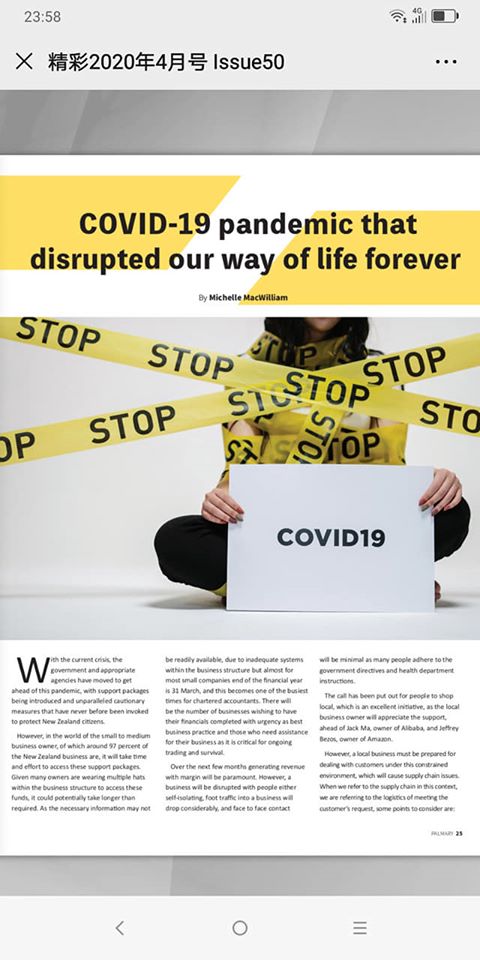By Michelle MacWilliam
With the current crisis, the government and appropriate agencies have moved to get ahead of this pandemic, with support packages being introduced and unparalleled cautionary measures that have never before been invoked to protect New Zealand citizens.
However, in the world of the small to medium business owner, of which around 97 percent of the New Zealand business are, it will take time and effort to access these support packages. Given many owners are wearing multiple hats within the business structure to access these funds, it could potentially take longer than required. As the necessary information may not be readily available, due to inadequate systems within the business structure but almost for most small companies end of the financial year is 31 March, and this becomes one of the busiest times for chartered accountants. There will be the number of businesses wishing to have their financials completed with urgency as best business practice and those who need assistance for their business as it is critical for ongoing trading and survival.
Over the next few months generating revenue with margin will be paramount. However, a business will be disrupted with people either self-isolating, foot traffic into a business will drop considerably, and face to face contact will be minimal as many people adhere to the government directives and health department instructions.
The call has been put out for people to shop local, which is an excellent initiative, as the local business owner will appreciate the support, ahead of Jack Ma, owner of Alibaba, and Jeffrey Bezos, owner of Amazon.
However, a local business must be prepared for dealing with customers under this constrained environment, which will cause supply chain issues. When we refer to the supply chain in this context, we are referring to the logistics of meeting the customer’s request, some points to consider are:
- How will the client see your product or understand your service?
- How will you engage with them with no face to face contact?
- How will you dispatch goods to the customer?
- But also how will they pay for the goods and services you are providing, overnight banking or pay wave are options.
The other issue facing business but possibly more important is how is a company able to market to their identified target customer base, to advise them how they can meet their customers’ needs or solve their problem at this time.
Regrettably, a lot of small businesses have not been proactive in the advancing of their digital brand, footprint and digital assets. Generally, due to the following reasons:
- It was not a priority at the time.
- They had a bad experience with a company or person working in the online arena.
- They investigated the idea and were overwhelmed with what they were presented with to establish an online presence.
- They were part way through developing their digital assets and strategy and were struggling to justify the cost involved, so the work was half done.
Having a weak digital presence and no strategy will hurt many businesses. As setting up a broad digital presence by which we mean having a touchpoint on multiple platforms or directories and developing a targeted approach that links the platforms to the identified customers takes time.
There are many aspects of increasing a digital footprint a business can complete some aspects in-house if given guidance, especially if you have staff who can assist, at this time, many employees will wish to help. Mainly if it assists in making their continued employment is potentially more secure in the future.
Database marketing will be invaluable at this time. Many independent businesses, either don’t collect names of customers who have purchased from them, or have not used their database to its full benefit. People who have purchased goods from you are highly likely to buy again or refer friends; they are your most cost-effective sales force.
To retrench or increase your marketing budget will depend on both your industry sector, your understanding and perception of who your target market is and how the local economy looks like for your business. Given none of us has a crystal ball, it comes down to a pure business decision to market or not.
If you decide to continue to advertise, be smart and selective, target your ideal customer. Make sure you are across the mediums you need to be both in the bricks and mortar world and online, research how you can interlink your advertising between the two worlds, as yet not everything is digital.
When engaging people in this area, check out their credentials. Digital marketing is a very young sector with many issues and opportunists.
In the coming months for many businesses and their owners, stressful and complicated decisions will need to be made that will have a direct impact and ongoing consequences for many. Often these will beyond their direct control and sphere of influence. Seeking counsel and support from informed and trust professionals, such as chartered accountants, lawyers, business advisors, employment relationship specialists and government agencies will be invaluable. These networks are interconnected and have an understanding of what the current position is. They have an in-depth knowledge base to draw from, and especially in Canterbury, the established professional networks have been at the forefront of supporting businesses in disaster scenario situations coming up one decade.
About the Author
Michelle is a well-established and acknowledged business advisor and strategist working in two different worlds, with New Zealand SMEs across many sectors. Her focus is especially in development of Omni Channels that assist a business transitioning from the bricks and mortar world to the digital/virtual for growth and future proofing. She also works with businesses, councils and other entities in development a China-New Zealand relationship that is based on both trust and integrity for long term relationship sustainability.
She sits on many committees, involved in a lead role in business engagement and the China-New Zealand relationship engagement.










